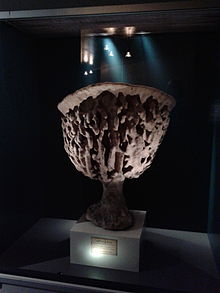Cliona patera
| Neptune's cup | |
|---|---|

| |
| Scientific classification | |
| Domain: | Eukaryota |
| Kingdom: | Animalia |
| Phylum: | Porifera |
| Class: | Demospongiae |
| Order: | Clionaida |
| Family: | Clionaidae |
| Genus: | Cliona |
| Species: | C. patera |
| Binomial name | |
| Cliona patera | |
| Synonyms | |
List
| |
Cliona patera, commonly called Neptune's cup sponge, is a species of demosponge in the family Clionaidae.[1]
Among the larger known sponges at up to a meter in height and width, the common name Neptune's cup refers to its characteristic wine glass shape and the Roman god of the sea. The species was thought to be extinct since late 1900s due to overharvesting, but live specimens were discovered in 2011 off the coast of Singapore[2][3] and Thailand. Later they were transported so they can be close enough to reproduce. Another population was later found in Cambodia.[4] In the early 1900s, they were used as baby baths because they grew so large.[5]
References
- ^ a b van Soest, R. (2014). Van Soest RW, Boury-Esnault N, Hooper JN, Rützler K, de Voogd NJ, de Glasby BA, Hajdu E, Pisera AB, Manconi R, Schoenberg C, Janussen D, Tabachnick KR, Klautau M, Picton B, Kelly M, Vacelet J (eds.). "Cliona patera (Hardwicke, 1820)". World Porifera database. World Register of Marine Species. Retrieved 2014-05-22.
- ^ Platt, John R. (17 November 2011). "Amazing Neptune's Cup Sponge Rediscovered in Singapore". Extinction Countdown blog. Scientific American. Archived from the original on 18 November 2011. Retrieved 2011-11-17.
- ^ Attenborough, David (2016). Wild City:Islands. Channel NewsAsia. Archived from the original on 2021-01-15. Retrieved 2019-02-24.
- ^ "Super-rare giant sponge discovered in seahorse hotspot | Fauna & Flora International". www.fauna-flora.org. Retrieved 2020-09-29.
- ^ Hance, Jeremy (22 November 2011). "Bathtub-sized marine sponge rediscovered after a century of extinction". news.mongabay.com.
